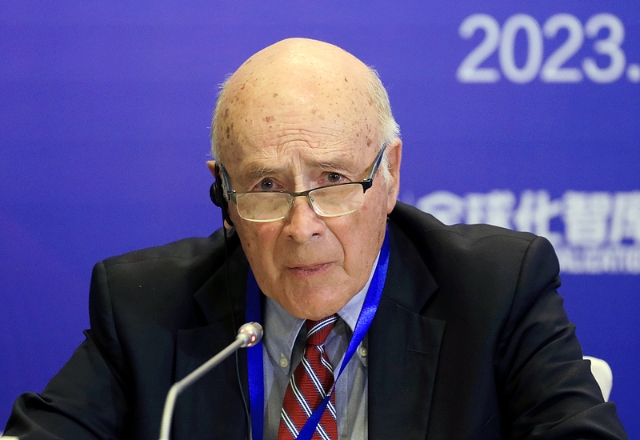
Joseph Nye attends the 8th China Global Think Tank Innovation Forum in Beijing on October 23, 2023. (CFP Photo)
Joseph Nye, the coiner of "soft power" and a prestigious scholar of international relations worldwide, died at the age of 88.
Born in 1937, Joseph Nye Jr. grew up in a small farming town in New Jersey. He graduated with a B.A. in history in 1958. After studying Philosophy, Politics, and Economics as a Rhodes Scholar at Oxford University's Exeter College, he obtained his Ph.D. in political science from Harvard University in 1964.
Apart from his academic achievements, Joseph Nye contributed to U.S. foreign policy-making. From 1994 to 1995, Nye served as Assistant Secretary of Defense for International Security Affairs in the Clinton Administration.
In early February of this year, Joseph Nye received an exclusive interview with GDToday on the vicissitudes of America's soft power and the 20-year cycle of China-U.S. relations.
Compared with the hard power of one country, Nye in the 1980s coined the term soft power, defining it as a country's ability to influence others without resorting to coercive pressure.
Reflecting on US domestic affairs since the Vietnam War, Nye detailed that American soft power weathered twists and turns during the Vietnam War, the invasion of Iraq, as well as the rise of Donald Trump, but witnessed a rise when Barack Obama came into office in the early 2010s.
Right now, as Nye observes, there is a weakening of American soft power due to domestic divisions.
Regarding himself as a short-term pessimist and a long-term optimist, he underscored that US-China relations have gone in cycles of roughly two decades.
Nye used "cooperative rivalry" to depict the relationship between China and the US. He projected that in the long run, the two countries are going to have better relations as they do not pose existential threats to each other.
The two sides still have differences that must be worked out in the short run. Unfortunately, Nye noted that these differences are tougher to resolve in the short term.
In this regard, he proposed that communication between the two sides should occur at all levels, particularly in the fields of cultural and scientific exchanges.
Reporter | Zhang Ruijun
Video Editor | Lu Xiaoyue
Video Script | Gu Yuebing, Liu Xiaodi
Cameramen | Gu Yuebing, Gao Yingshi
Editor | Yuan Zixiang, James, Shen He
















